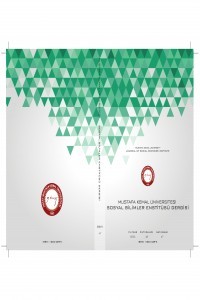Öğretmen Adaylarının Kullandıkları Öğrenme Stratejilerinin Öğrenmenin Çabaya Bağlı Olduğuna İnançlarını Yordama Gücü/ The Predıctıve Power Of Prospectıve Teachers' Learnıng Strategıes On The Belıef That Learnıng Depends On Effort
bağlı olduğuna inançlarını yordama güçlerinin cinsiyetlerine ve okudukları bölüme göre değişip değişmediğini ortaya koymaktır. Çalışma, 2009-2010 öğretim yılı güz döneminde Zonguldak Karaelmas Üniversitesi (Bülent Ecevit Üniversitesi) Ereğli Eğitim Fakültesinde öğrenim gören 321 öğretmen adayı üzerinde yürütülmüştür. Çalışmada yöntem olarak betimsel yöntemlerden korelasyon yöntemi kullanılmıştır. Çalışmanın verileri “epistemolojik inanç ölçeği” ve “bilişsel öğrenme stratejileri ölçeği” ile toplanmıştır. Epistemolojik inanç öğrenmenin çabaya bağlı olduğuna inanç (ÖÇBOİ),öğrenmenin yeteneğe bağlı olduğuna inanç(ÖYBOİ), ve tek doğru olduğuna inanç faktörlerinden oluşurken; öğrenme stratejileri, uygulama, bellek, analiz, özetleme, tekrarlama ve anlatma stratejilerinden oluşmaktadır. Verilerin analizinde korelasyon değerlerine ve basamaklı regresyon analizine başvurulmuştur. Çalışmanın sonunda, uygulama, bellek ve analiz stratejilerinin öğretmen adaylarının öğrenmenin çabaya bağlı olduğuna ilişkin inanç puanlarının %95'ini yordadığı bulunmuştur. Uygulama stratejisi en güçlü yordayıcı olmuştur. Erkek öğretmen adaylarının ÖÇBOİ'larının en güçlü yordayıcısı uygulama stratejisi iken, kadın öğretmen adaylarınınki bellek stratejisi olmuştur. Uygulama stratejisi her üç bölüm öğretmen adaylarının en güçlü yordayıcısı olmuştur. Anahtar Kelimeler: Öğretmen Adayları, Öğrenme Stratejileri, Epistemolojik İnanç. Abstract The purpose of the study was to reveal the predictive power of prospective teachers' learning strategies on the belief that learning depends on effort (BLDE) in terms of their gender and department. The data of the study was collected from 321 prospective teachers studying in Zonguldak Karaelmas University,(Bülent Ecevit University) Ereğli Education Faculty in 2009-2010 academic year. Instruments were “scale of epistemological belief” and “scale of cognitive learning strategies”. It was a correlational study from descriptive studies. While epistemological belief constitues beliefs that learning depends on effort (BLDE), learning depends on ability (BLDA) and belief that true is one (BTO); learning starategies was application, memory, analysis, summarizing, repetition, explanation stratejgies. Analysis methods of data Pearson product-moment correlation coefficient and stepwise regression analysis method. It is observed that using the application, memory and analysis strategies, predict 95% of BLDE scores. Applicatİon strategies have become the strongest predictor of BLDE scores. (67%). While the strongest predictor of men prospective teachers' BLDE is application strategy, the strongest predictor of women prospective teachers' BLDE is memory strategy. Again, application strategies was strongest predictor of prospective teachers in all departments. Key Words: Prospective Teachers, Learning Strategies, Epistemological Belief.
Anahtar Kelimeler:
Öğretmen Adayları, Öğrenme Stratejileri, Epistemolojik İnanç
___
- Bendixen, L. D. (2002). “A process model of epidemic belief change”. B. K. Hofer & P. R. Pintrich (Ed.), Personel epistemology: The psychology of beliefs about knowledge and knowing. (191-208). Hillsdale, NJ: Erlbaum.
- Brownlee J., Purdie N. & Boluton-Lewis, G. (2001). “Changing Epistemological Beliefs in Pre-Service Teacher Education Students”. Teaching in Higher Education, 6(2), 247-268.
- Buelens, H., Clement, M. & Clarebout, G. (2002). “University Asistants' Conceptions of Knowledge, Learning and Instruction”. Research in Education, 67, 44-57.
- Craik, F. I. M. & Lockhart, R. S. (1972). “Levels of Processing: A Framework for Memory Research”. Journal of Verbal Learning and Verbal Behavior, 11, 671-684.
- Cano, F. & Cardelle-Elavar, M. (2004). “Students' Beliefs About Learning and Knowledge: An Integrated Analysis”. European Journal of Psychology of Education, 19, 167-187.
- Debacker, T. K. & Crowson, H. M. (2006). “Influences on Cognitive Engagement: Epistemological Beliefs and Need for Closure”. British Journal of Educational Psychology, 76, 535-551.
- Deryakulu, D. ve Büyüköztürk, Ş. (2002). “Epistemolojik İnanç Ölçeğinin Geçerlik ve Güvenirlik Çalışması”. Eğitim Araştırmaları, 8, 111-125.
- Deryakulu, D. (2004). “Üniversite Öğrencilerinin Öğrenme ve Ders Çalışma Stratejileri ile Epistemolojik İnançları Arasındaki İlişki”. Kuram ve Uygulamada Eğitim Yönetimi, 38, 230-249.
- Gredler, M. E. (2001). Learning and Instruction: Theory into Practice (4th ed.). Upper ; Saddle River, NJ: Merill/Prentice Hall.
- Gürcan, A. (2005). “Bilgisayar Özyeterliği Algısı ile Bilişsel Öğrenme Stratejileri Arasındaki İlişki”. Eğitim Araştırmaları,19, 179-193.
- Karasar, N. (2005). Bilimsel Araştırma Yöntemi (14. Baskı). Ankara: Nobel Yayın Dağıtım.
- Kıray, S.A. (2010). İlköğretim ikinci kademede uygulanan fen ve matematik entegrasyonunun etkililiği. Yayımlanmamış Doktora Tezi. Ankara: Hacettepe Üniversitesi, Sosyal Bilimler Enstitüsü.
- Kızılgüneş, B., Tekkaya, C., ve Sungur, S. (2009). “Modeling The Relations Among Students' Epistemological Beliefs, Motivation, Learning Approach and Achievement”. The Journal of Educational Research, 102(4), 243-255.
- Önen, A. S. (2011). “Öğrencilerin Epistemolojik İnançları ile Ders Çalışmaya Yönelik Tutumlarının İncelenmesi”. Hacettepe Üniversitesi Eğitim Fakültesi Dergisi, 40, 300-309.
- Phan, H. P. (2006). “Examination of Student Learning Approachs, Reflective Thinking, and Epistemological Beliefs: A Latent Variables Approach”. Electronic Journal of Research. No: 10 , 4(3), 577-610.
- Phan, H. P. (2008). “Amalgation of Future Time Orientation, Epistemological Beliefs, Achievement Goals and Study Strategies: Empirical Evidence Established”. British Journal of Educational Psychology, 79, 155-173.
- Philips, F. (2001). “A Research Note on Acconunting Students' Epistemological Beliefs, Study Strategies, and Unstructured Problem-Solving Performance”. Issues in Accounting Education, 16(1), 21-39.
- Ravindran, B., Greene, B. A. Debacker, T. K. (2005). “Predicting Preservice Teachers' Cognitive Engagement With Goals and Epistemological Beliefs”. The Journal of Educational Research, 98(4), 222-232.
- Rodriguez, L. & Cano, F. (2006). “The Epistemological Beliefs, Learning Approaches and Study Orchestrations of University Students”. Studies in Higher Education, 31(5), 617-636.
- Schommer, M. (1990). “Effects of Beliefs About The Nature of Knowledge on Comprehension”. Journal of Educational Psychology, 82(3), 498-504.
- Schommer, M., Cruose, A. & Rhodes N. (1992). “Epistemological Beliefs and Mathematical Text Comprehension, Believing It is Simple Does Not Make It So”. Journal of Educational Psychology,82, 435-443.
- Schommer, M. (1993). “Epistemological Development and Academic Performance Among Secondary Students”. Journal of Educational Psychology, 85(3), 406-411.
- Schommer, M. (1998). “The influence of Age and Education on Epistemological Beliefs”. British Journal of Educational Psychology, 68, 551-562.
- Schunk, D. H. (2000). Learning Theories: An Educational Perspective (3th Ed.). Upper Saddle River, NJ: Merill/Prentice Hall.
- Başlangıç: 2004
- Yayıncı: Hatay Mustafa Kemal Üniversitesi
Sayıdaki Diğer Makaleler
Nuri Karasakaloğlu, A. Saracaloğlu, Serap Yılmaz Özelçi
Türk Demokrasisine Müdahaleler/ Interventions To Turkish Democracy
